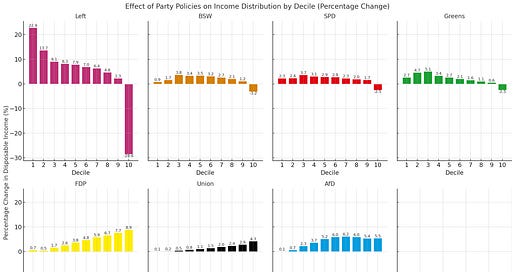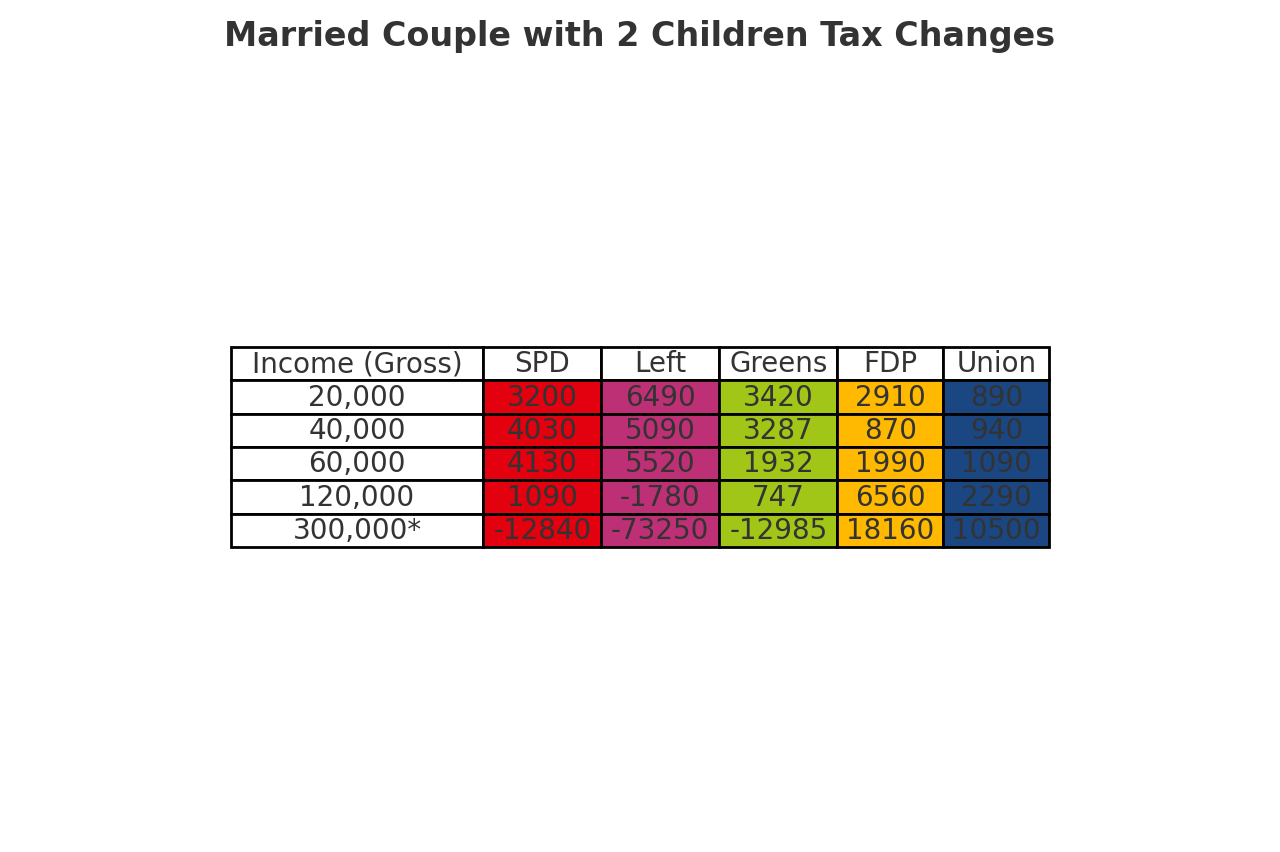Tax cuts without touching the debt break are utopian.
CDU/CSU and FDP are promising major tax cuts and additional investments without touching the debt break. That's simply out of touch with reality.
Dear Readers,
the election is less than four weeks away and the parties plans, ideas are becoming more precise and different economy institutes have taken a deeper look at the plans of the different parties. FDP and CDU/CSU are giving false promises to their voters: Major tax cuts and investments into the infrastructure of our country with no (or only very little) new debt. Two different Institutes for Economy in Germany have calculated what the consequences of the parties plans are for private households and for the fiscal budget.
First of all: CDU/CSU and FDP are parties for those whom are better off. With them in charge, they would especially relieve those with higher incomes. The Leibniz Centre for Economic Research (ZEW) shows how you get more benefits, the higher your income is according to the plans of the FDP and CDU/CSU - not to mention the AfD which is far from interested in social justice. SPD, Greens, BSW and The Left plan to help lower and middle incomes the most while making the richest 10% pay for it, with The Left taking it into the extreme:
Not only that, but especially the plans of AfD and FDP would also increase poverty risk rate and increase the gap between rich and poor (visualised in form of the Gini-Coefficent):


More than questionable practicability
Yet, if you believe that the ideas proposed by FDP and CDU/CSU are good, that’s your good right - but it is still far from realistic that FDP and CDU/CSU would actually be able to keep their promises. Both parties strictly hold on to the constitutional debt brake which only allows for little new debt to be taken by the federal government and even less by the state governments. Yet both parties not only want these tax cuts while keeping the debt brake, they also want to (and have to!) increase spendings as major investments are needed for our infrastructure. So, FDP and CDU/CSU want to spend more while earning less money and keeping the debt brake - that’s simply impossible. Our last government already failed because of negotations over the federal budget, particularly about the debt brake. Now imagine how hard these negotations would be in case of less earnings while wanting to invest more.
The German Economic Institute (IW) and the ZEW both did their own calculations on what the parties ideas would imply for the government budget. In detail their calculations differ but the conclusion stays the same: CDU/CSU (47-89 billion euros) and especially AfD (97-149 bil) and FDP (116-138 bil) are decreasing the budget by a lot without offering solutions how they will be able to finance major investments into infrastructure - a reform of the debt brake is out of contention for them. They often say that they will cut unemployment benefits and other useless costs that the government has. In 2024 German unemployment benefits, Bürgergeld, cost the state 26.5 billion Euros. Even if the next government would be able to cut that cost by half (which is far from realistic) that would still only be a fraction of the deficit generated by the tax cuts. On the other side they argue that the newly generated growth will generate higher tax revenues and compensate the deficit. While tax cuts may generate economic growth, that does not just happen over night. Consumers need to feel safe again to consume more and that takes time. Also, even if economic growth would fully compensate the deficit in long term (which is also questionable), investments into our infrastructure need to be addressed now and can’t wait a few years. The only logical and honest answer to how tax cuts and investments are feasible is taking on more debt - Everything else is a false promise, can’t be taken serious and is disrespectful to the voters.
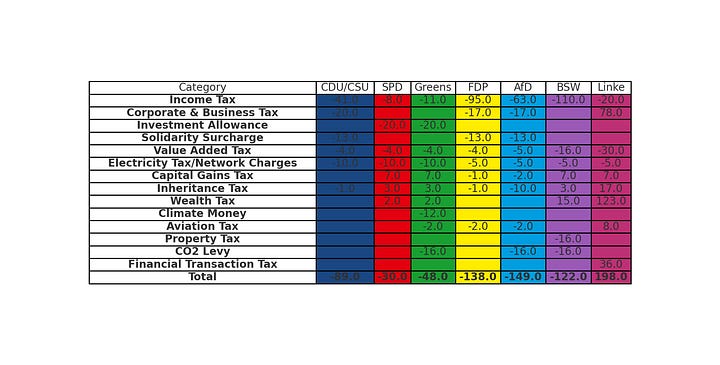
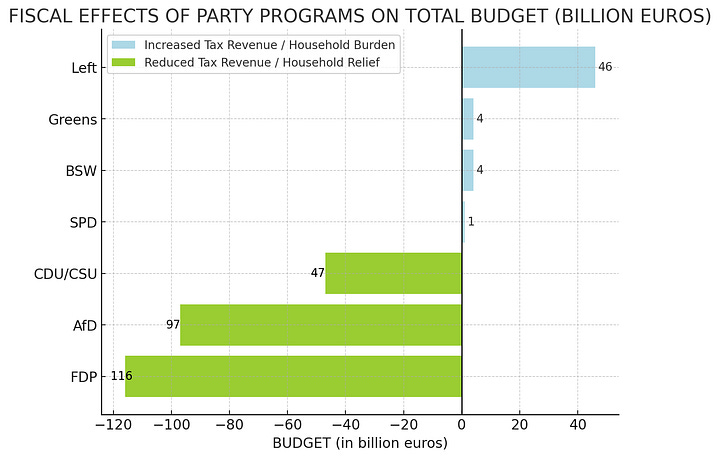
“The debt brake is effectively a tax cut brake”
In April of 2024 the director of the IW, Prof. Dr. Michael Hüther, already concluded that, practically, tax cuts are not possible without going into debt. Instead, he proposed that tax cuts which stimulate economic growth should excluded from the debt brake as an exception. The needed new debt should then be linearly stretched over the next five years. That’s just one idea of many but it just shows that however you twist it, tax cuts aren’t possible without new debt.
Also, already in 2021 SPD, Greens and FDP (which then formed the government) all planned tax cuts for lower and middle incomes. The only reason why these plans didn’t come into reality is the debt brake.
It’s absurd that it’s Lindner who proposes the largest tax cuts without saying how its feasible after he has been Minister of Financial Affairs inside a government which failed because they didn’t manage to agree on a federal budget. Democratic parties have to start facing reality and agree on taking on new debt to actually change things in this country. As I have said, already in 2021 the parties promised tax cuts and reliefs for the population but instead the only thing that they could agree on was countering the additional burden given to the households due to the inflation.
One more thing: Even with higher debts, Germany would be able to decrease its ratio of debt to GDP towards 60% (Maastricht Criteria). Taking on debt to the amount of 1.5% of the GDP (debt brake allows for 0.35%) would decrease our debt ratio from 66% in 2022 to 61% in 2030. Even debt as high as 1.8% of our GDP would keep our debt rate constant at 64% until 2030.
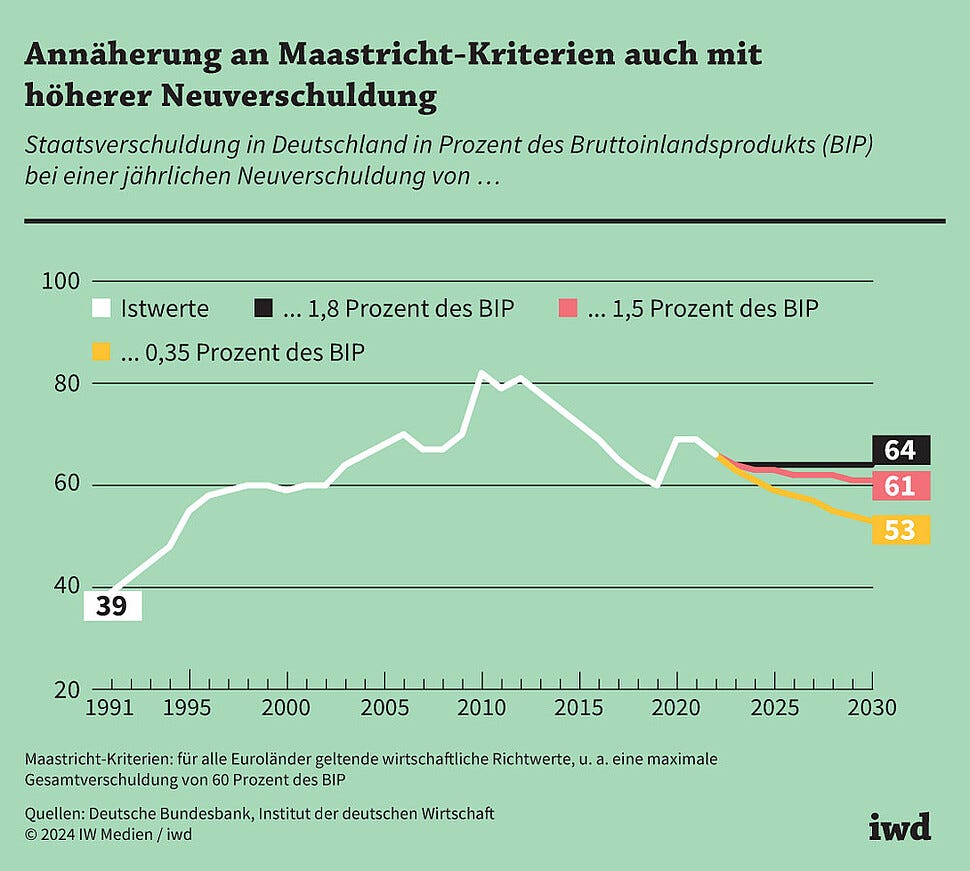
Concluding, CDU/CSU and FDP aren’t honest to their voters when it comes to economic policies even though Germans are attributing the CDU/CSU the highest competence in economic and tax policies. Tax Cuts, additional investments and not touching the debt break is nothing short of utopian and out of touch with reality.




